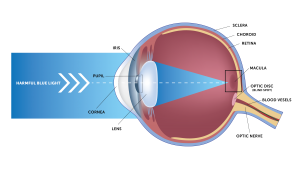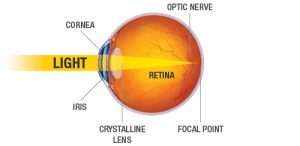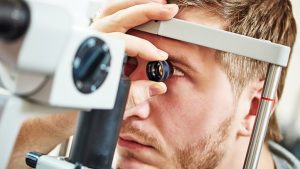Many of us take our vision for granted, but have you ever wondered how this fascinating organ actually works? How do our eyes allow us to see objects as small as a human hair, or as far away as the Andromeda Galaxy (2.6 million light years)?
Light enters our eyes
 Light from the sun, or an artificial light, travels in a straight line, bounces off objects and into our eyes through the pupil. Depending on the amount of light, the iris changes the size of the pupil to let more or less light in. This is to prevent damage to the eyes, by stopping too much light entering the eye when it is bright, and maximising the amount of light entering the eye when it’s dark.
Light from the sun, or an artificial light, travels in a straight line, bounces off objects and into our eyes through the pupil. Depending on the amount of light, the iris changes the size of the pupil to let more or less light in. This is to prevent damage to the eyes, by stopping too much light entering the eye when it is bright, and maximising the amount of light entering the eye when it’s dark.
The light is focussed
 The light then passes though the lens. The lens focuses the light onto the back surface of the eye, the retina. Depending on how far away the object is, our lens needs to change shape to keep the light focussed on the retina.
The light then passes though the lens. The lens focuses the light onto the back surface of the eye, the retina. Depending on how far away the object is, our lens needs to change shape to keep the light focussed on the retina.
A fatter lens bends light more than a flatter lens. The human eye changes the shape of the lens as we look at far or near objects to keep them in focus. This is called accommodation. When we look at a far object, the light does not need to bend a lot to converge on the retina, so the suspensory ligaments pull on the lens to make it flat. When we look at a near object, the light has to bend more to converge on the retina, so the suspensory ligaments pull less, allowing the lens to spring back into a fatter shape,
What is a comprehensive dilated eye exam?
 A comprehensive dilated eye exam is a painless procedure in which an eye care professional examines your eyes to look for common vision problems and eye diseases, many of which have no early warning signs. Regular comprehensive eye exams can help you protect your sight and make sure that you are seeing your best.
A comprehensive dilated eye exam is a painless procedure in which an eye care professional examines your eyes to look for common vision problems and eye diseases, many of which have no early warning signs. Regular comprehensive eye exams can help you protect your sight and make sure that you are seeing your best.
Read more
Natural remedies for better eyesight
 Vision problems are quickly becoming a common disease in this day and age. With an exponential increase in the number of hours we spend in front of a screen, the phenomenon comes as no surprise. Even children are spending more time in front of computer or TV straining their eyes for no reason. Before knowing how you can improve your eyesight naturally,
Vision problems are quickly becoming a common disease in this day and age. With an exponential increase in the number of hours we spend in front of a screen, the phenomenon comes as no surprise. Even children are spending more time in front of computer or TV straining their eyes for no reason. Before knowing how you can improve your eyesight naturally,
Read more
Best Foods for Your Eyes
 An explosion of food-related research shows a strong connection between food and health. Growing evidence supports the idea that vitamins and minerals in various foods fuel your body and protect vision for the long haul.
An explosion of food-related research shows a strong connection between food and health. Growing evidence supports the idea that vitamins and minerals in various foods fuel your body and protect vision for the long haul.
Vitamins A, C, and E form a fitting acronym (ACE) when it comes to vision. A major federal study showed that the combo, plus zinc, is a winner when it comes to lowering risk of advanced AMD. Below are some simple ways to stay healthy and care for your vision.
Read more
Computer Eye Strain
 Many people who use computers complain of eye strain. Looking at a monitor for a long time can strain your eyes or can make any other problems you are having with your eyes seem more noticeable.
Many people who use computers complain of eye strain. Looking at a monitor for a long time can strain your eyes or can make any other problems you are having with your eyes seem more noticeable.
Read more
First aid care for eye injuries

Any kind of injury or trauma to the eyes should be taken seriously. Prompt medical attention for eye problems can save your vision and prevent further complications.
Read more

